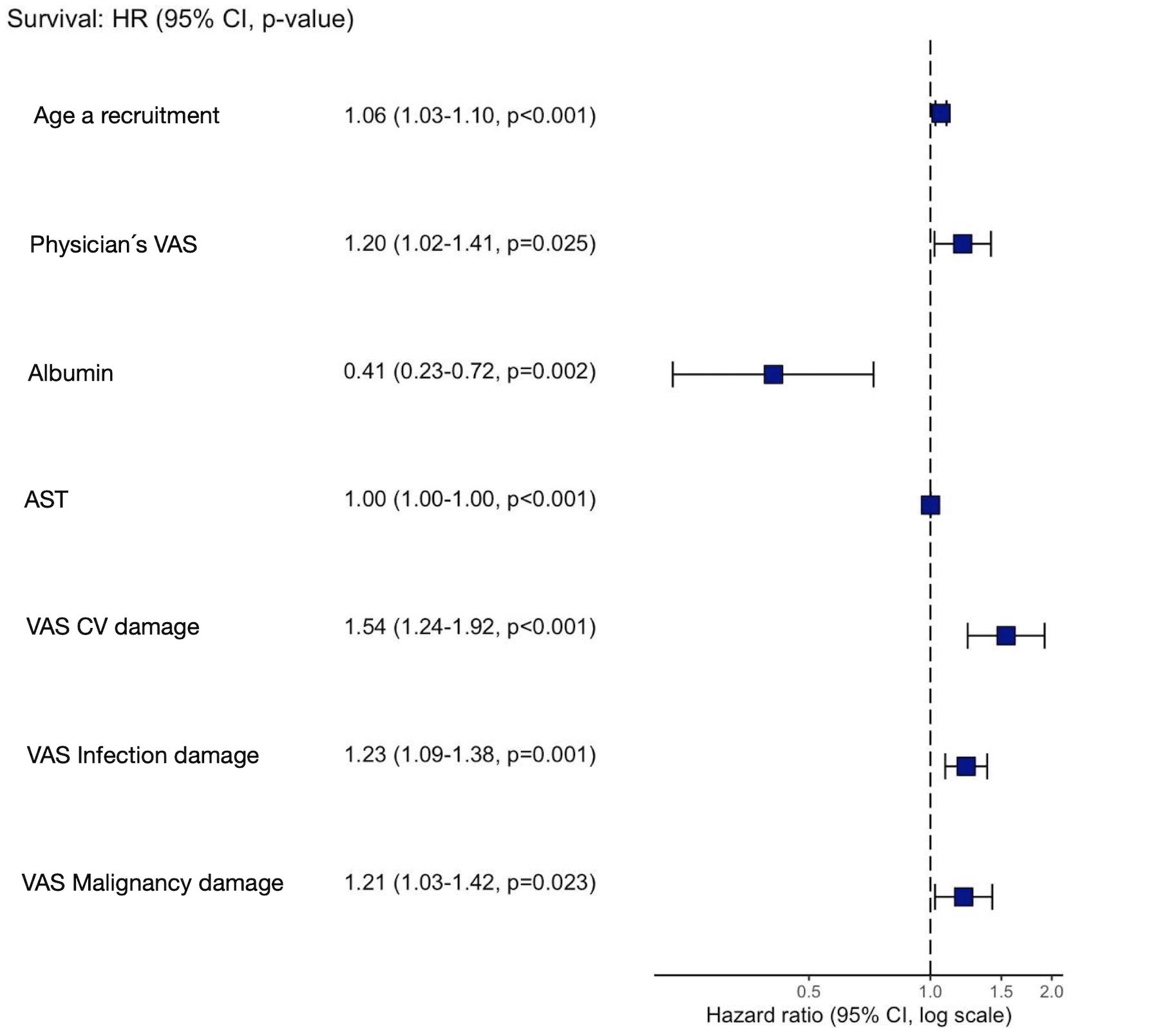Session Information
Date: Tuesday, October 28, 2025
Title: (2052–2078) Muscle Biology, Myositis & Myopathies – Basic & Clinical Science Poster III
Session Type: Poster Session C
Session Time: 10:30AM-12:30PM
Background/Purpose: Idiopathic inflammatory myopathies (IIM) are a group of autoimmune diseases characterized by muscular inflammation that can affect any organ or system. Reported mortality rates are as high as 23–73% due to delayed diagnosis, cardiac and pulmonary involvement, or severe muscle weakness, as well as associated infections and neoplasia. However, the leading causes of mortality vary globally according to the different published cohorts.
Methods: For this prospective cohort study, we recruited 219 IIM patients according to the ACR/EULAR or Connors’ criteria. At recruitment (baseline), we assessed the clinical features, muscle enzymes, the myositis disease activity assessment tool (MDAAT), the myositis damage index (MDI), the health assessment questionnaire disability index, the manual muscle test 8 (MMT8), the visual analog scale (VAS) of disease activity by the patient and the physician and the myositis specific and associated antibodies by Lineblot. All patients were followed up prospectively looking for the primary outcome, which was mortality. To assess the independent predictors of mortality, we performed multivariate logistic regression and Cox analyses to calculate the Odds and Hazard ratios with 95% confidence interval.
Results: 164 patients were women (74.8%), the most frequent diagnosis was dermatomyositis (Nf 157, 71.6%). After a median follow-up of 62 months, 32 patients (14.6%) died. At baseline, patients who died were older at recruitment (47(39-52) vs 41(31-52), P=0.04), had more frequently positive anti-SRP (12.5% vs 1.6%, P=0.009), and anti-MDA5 (28.1% vs 11.7%, P=0.024), cancer (15.6% vs 3.7%, P=0.018), lower levels of serum albumin (2.9(2.5-3.6) vs 3.9(3.3-4.2), P< 0.0001), and higher median (min-max) of VAS of gastrointestinal (GI) (0 (0-10) vs 0 (0-7), P=0.0003) and cardiovascular (CV) (0 (0-10) vs 0 (0-6), P=0.04) damage. The independent predictors of mortality were SRP+ (OR 26.24 (95% CI 2.95-283.1), P=0.008), MDA5+ (4.13 (1.23-13.63), P=0.038), malignancy (6.5 (1.20-33.43), P=0.006), albumin (0.26 (0.12-0.51), P< 0.0001), VAS of GI damage (1.41 (1.12-1.81, P=0.006), and VAS of CV damage (2.01 (1.38-3.43), P=0.0001). After Cox analysis, we found the following risk factors for mortality: SRP+ (Hazard Ratio 19.8 (95% CI 5.52-71.0), P< 0.001), MDA5+ (4.92 (1.89-12.8), P=0.001), age at recruitment (1.05 (1.01-1.09), P=0.011), smoking (3.21 (1.35-7.66), P=0.009), physician’s VAS of disease activity (1.27 (1.05-1.53), P=0.015), albumin (0.33 (0.17-0.66), P=0.002), aspartate aminotransferase (1.00 (1.00-1.00), P< 0.001), VAS of CV damage (1.76 (1.37-2.24), P< 0.001), infectious damage (1.25 (1.09-1.43), P=0.002) and malignancy damage (1.41 (1.17-1.70), P< 0.001). In figure 1, we show a graphical representation of the effect of each risk factor of mortality. In figure 2, we depict the hazard ratios for mortality in patients with IIM.
Conclusion: This prospective study of well characterized IIM patients revealed anti SRP and MDA5 antibodies and the GI, CV, infectious and malignancy damage accrual as key novel risk factors of mortality in this group of diseases.
 Figure 1. Graphical representation of the effect of each risk factor for mortality in patients with IIM.
Figure 1. Graphical representation of the effect of each risk factor for mortality in patients with IIM.
.jpg) Figure 2. Hazard ratios of each variable independently associated with mortality in patients with IIM.
Figure 2. Hazard ratios of each variable independently associated with mortality in patients with IIM.
To cite this abstract in AMA style:
Hernández-López A, Mejía Domínguez N, Reyna Juárez Y, Ostos Prado M, Alcalá Carmona B, Balderas Miranda J, Núñez-Álvarez C, Baños-Laredo M, Gómez-Martín D, Torres-Ruiz J. A Prospective Study Unveils Damage Accrual and Myositis Specific Antibodies as Key Risk Factors for Mortality in Myositis [abstract]. Arthritis Rheumatol. 2025; 77 (suppl 9). https://acrabstracts.org/abstract/a-prospective-study-unveils-damage-accrual-and-myositis-specific-antibodies-as-key-risk-factors-for-mortality-in-myositis/. Accessed .« Back to ACR Convergence 2025
ACR Meeting Abstracts - https://acrabstracts.org/abstract/a-prospective-study-unveils-damage-accrual-and-myositis-specific-antibodies-as-key-risk-factors-for-mortality-in-myositis/
